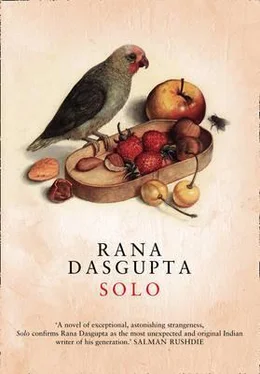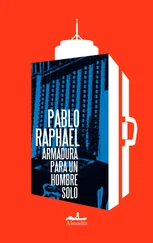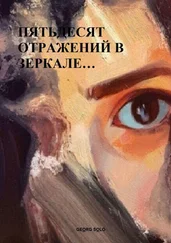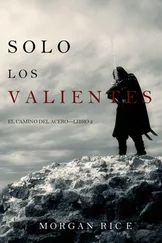Ulrich is speaking heatedly.
‘How many stopped-up men and women does it take to produce one Einstein? Ten? A thousand? A hundred thousand? We can’t answer questions like that, they are simply too mysterious. But we know that if we are to feel the thrill of progress and achievement, there have to be sacrifices elsewhere.’
Ulrich raises his eyebrows at Boris.
‘So this is what Einstein meant, when he looked me in the eye that day and said, I would be nothing without you . It was not success he saw written in my face. He saw, rather, that I would never accomplish anything in my life.’
At this point in the old man’s speech, Boris spies a gap in the railings and he drives the car off the road. It jerks violently over the edge, and Ulrich is forced to grab on to his door handle. The crest of the grassy bank bounces in the frame of the windscreen and the unevenness of the slope shakes them from side to side. They climb the slope and, still juddering, they reach the summit. The horizon opens, they see the great ocean glittering beyond, and the car comes to a halt.
Boris turns off the engine, and there is silence. They can see the containers stacked high in the port, and the cranes, and the trucks queued up for cargo.
Ulrich says,
‘I have a lot of failure to give away. Look at my music: a fantastic failure. A triumphant failure — I nurtured it for a lifetime!’
The sun is setting now, over the land, and the ships on the sea are aflame in the final rays.
‘My failed music, Boris, that’s my gift to you. That’s the legacy I leave behind.
‘If I could make an Einstein with my failed science, think what will come of my music!’
Boris is fully attentive, but Ulrich is not sure he understands everything he is saying. Ulrich has the impression, not for the first time during this ride, that Boris has become more absent than before. Perhaps it is because he no longer has his violin. He is acting strangely, as if he is worried about waking someone: his voice has become soft and he takes care to avoid sudden movements.
Boris opens the door and gets out of the car, leaving the keys in the ignition. The wind is strong off the sea, and his hair is swept back. He takes Ulrich’s arm and walks him down the slope to the highway. The air smells of salt and kelp and manatee.
Ulrich says,
‘I’m happy I had this time with you.’
Boris is watching the highway, waiting for something, and before long a grey van appears in the distance. He steps into the road and waves to attract its attention. Ulrich realises that time is short and there are still so many things he has not asked. As the van draws up he says,
‘Where are you going?’
Boris puts his face close to Ulrich.
‘I have a new music in my head,’ he says. ‘Since Irakli died I’ve been hearing something new. But it’s so remote I can’t grasp it well. I need to find somewhere quiet. I want to be alone again.’
Ulrich treats this information as if it is an amazing revelation. He breathes it in and it sets him nodding for a while. A new music , he mutters to himself.
The van door opens from inside, and there are several men crowded there who haul Boris in, laughing and clapping him on the back. They greet him in Russian. Boris reaches for the open door.
‘These men are my friends,’ he says to Ulrich. ‘They’re sailors. They’re going to hide me in their ship.’
He grasps Ulrich’s hand, and Ulrich holds on tight. It is all happening so fast.
‘Thank you!’ Boris calls — but the van is already pulling away. Boris lets go of Ulrich’s hand and slams the door. He waves from inside the moving vehicle.
Ulrich shouts,
‘Wait!’
He runs as best he can, banging on the van’s metal rear with the flat of his hand until it slows again, and stops. He catches up finally, holding his chest.
‘That nearly killed me,’ he says breathlessly, supporting himself against the van. His face is radiant. He says,
‘I forgot. This is for you.’
He shows him the gold watch on his wrist.
‘Can you take it off me? I have trouble doing it myself.’
Boris can see the glow in Ulrich’s face, and it has an inviting authority. He steps out of the van to undo the watchstrap. He takes the watch off and puts it on his own wrist. Ulrich smiles, seeing it there. He puts his arms around Boris’s bigger frame and embraces him. Boris returns his affection, holding him like a vice while the air is whipped by passing cars and the sailors call out from the van. Boris turns and gets back in.
‘Goodbye,’ he says.
‘Goodbye,’ Ulrich replies, smiling. He has lived this parting before, and this time it is joy.
A tinnitus starts up in his ears. He still has the force of Boris in his arms, and from the depths of his memory, an ancient word floats into his throat, speaking itself through his involuntary mouth. So-i-né .
He has been trying to think of that word for — what? — decades and decades. It is a Japanese word he heard about long ago. It speaks of a feeling that is not named in the old man’s own language. The unique sensuality of holding an infant. Not erotic, but indecent, nevertheless, in its fervour .
The engine roars, the van pulls out, and Ulrich watches it drive away. The sun is bursting on the horizon, and gulls cry overhead, infinite and plaintive. At last the van turns into the port, and Ulrich can see it no more.
For conversations and stories: Irina Aristarkhova, Nadeem Aslam, Rossitsa Draganova, Elena Filipovic, Graham Harwood, Robert Hutchinson, Claire Levy, Boris Katzunov, Nikoloz Kenchosvili, Christina Madjour, Vakhtang Maisaia, Siddhartha Mukherjee, Tim Parks, Lisl Ponger, Shveta Sarda, Alexis Schwarzenbach, Shuddhabrata Sengupta, Tristram Stuart, Jeet Thayil, Matsuko Yokokoji, and the members of Riyaz.
Thanks to Valery Katzunov for unforgettable walks through Sofia, and to Alexander Kiossev, who, when I related the story I was about to write, said, You have just told me the life of my father . Thanks to Natalia Kajaia, who led me through the remarkable worlds of her Tbilisi. And to Paul Fennell, who explained how to make barium chloride.
Thanks to my agent, Toby Eady, for bewildering insights whose brilliance unfurled over time. To Laetitia Rutherford for getting me drunk and making everything clear. To Tilo Eckardt and Nicholas Pearson, who set me straight and reined me in.
In writing this novel I have enjoyed the immense privilege of a number of dedicated and exhilarating allies. All words fall short of the affections and insights offered by Jeebesh Bagchi, Sofia Blake, Marlene Nichols, Bhrigupati Singh, Prerna Singh and Phil Taffs.
Alas, one of these allies, Shakti Bhatt (1980–2007), did not live to see the end. These pages bear her trace, and my gratitude to her is, I suppose, eternal.
Monica Narula has lived in delicious complicity with this novel. She has inspired it, reasoned it and loved it — and dedicating it to her is like throwing a wave back into the sea.
The folksong heard by Ulrich and Boris on pages 61–2 is adapted from a song described by Tim Rice in his account of Bulgarian music, May It Fill Your Soul (University of Chicago Press, 1994), page 154.
The opening of Alexander Pushkin’s Eugene Onegin on pages 121–2 is adapted from a translation by Vladimir Nabokov (Princeton University Press, 1991, page viii) and the translation by James E. Falen (Oxford World’s Classics, 1998, page 5).
The jokes on pages 122–3 are adapted from Russia Dies Laughing: Jokes from Soviet Russia by Zhanna Dolgopolova (Unwin, 1983).
The lines on page 223 are from Anna Akhmatova’s poem ‘Requiem’ as translated by Judith Hemschmeyer in Selected Poems of Anna Akhmatova (Zephyr Press, 2000).
Читать дальше
Конец ознакомительного отрывка
Купить книгу












